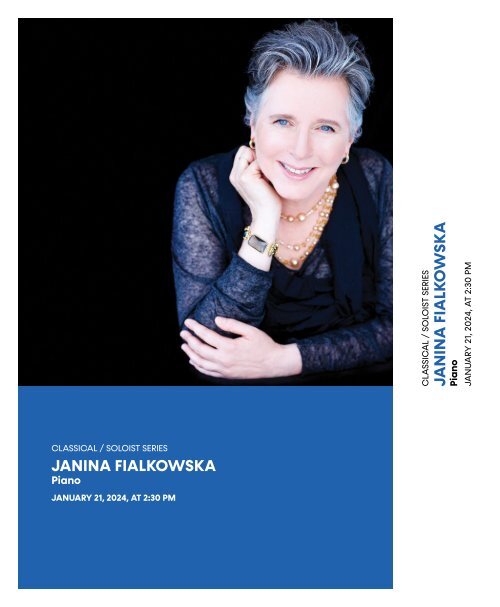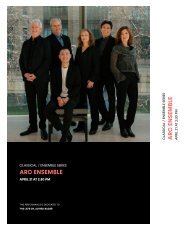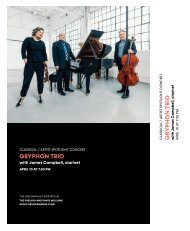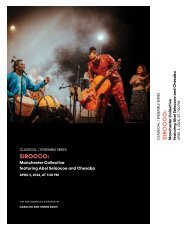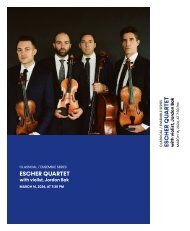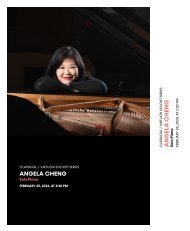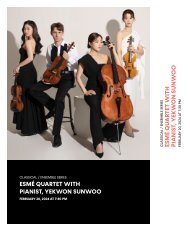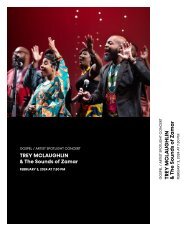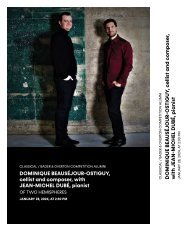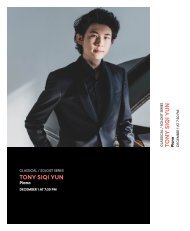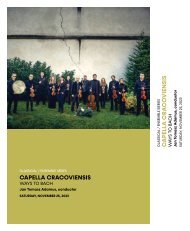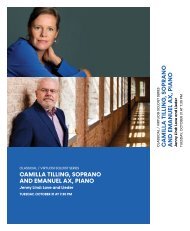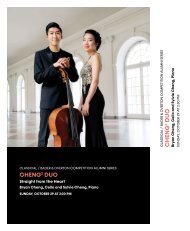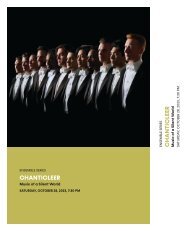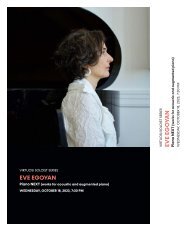Create successful ePaper yourself
Turn your PDF publications into a flip-book with our unique Google optimized e-Paper software.
CLASSICAL / SOLOIST SERIES<br />
JANINA FIALKOWSKA<br />
Piano<br />
JANUARY <strong>21</strong>, <strong>2024</strong>, AT 2:30 PM<br />
CLASSICAL / SOLOIST SERIES<br />
JANINA FIALKOWSKA<br />
Piano<br />
JANUARY <strong>21</strong>, <strong>2024</strong>, AT 2:30 PM
CLASSICAL / SOLOIST SERIES<br />
JANINA FIALKOWSKA<br />
Piano<br />
JANUARY <strong>21</strong>, <strong>2024</strong>, AT 2:30 PM<br />
PROGRAM<br />
SCHUBERT Piano Sonata No. 7 in E Flat Major, Op. 122, D. 568<br />
Allegro moderato<br />
Andante molto<br />
Minuetto: Allegretto – Trio<br />
Allegro moderato<br />
BRAHMS Intermezzo in B Flat Major, Op. 76, No. 4<br />
Rhapsodie in B Minor, Op. 79, No. 1<br />
Intermezzo in A Major, Op.118, No. 2<br />
Intermezzo in B Flat Minor, Op. 117, No. 2<br />
Capriccio in D Minor, Op. 116, No. 7<br />
INTERMISSION<br />
CHOPIN Polonaise in C Sharp Minor, Op.26, No. 1<br />
Ballade No. 2 in F Major, Op. 38<br />
Mazurka in B Flat Major, Op. 7, No 1<br />
Mazurka in E Minor, Op. 17, No. 2<br />
Scherzo No. 4 in E Major, Op. 54
PROGRAM NOTES<br />
Franz Schubert (1797-1828) was a prolific<br />
composer who lived his entire short life in Vienna.<br />
While he appeared to write songs with great ease<br />
and imagination, he seems to have laboured more<br />
when composing piano sonatas than almost any<br />
other genre, completing only eleven of the almost<br />
two dozen he started. Still, the completed works<br />
are richly rewarding, often displaying an emphasis<br />
on lyrical melodic writing as can be heard in<br />
the E-Flat Major Sonata that opens this concert.<br />
Curiously, this work began with three movements<br />
of sketches from 1817 for a D-Flat Major Sonata<br />
but, with the prospect of publication a decade<br />
later, these movements were transposed to E-Flat<br />
Major, extensively rewritten, and increased to four<br />
movements with the addition of a minuet. The lilt<br />
of this minuet’s graceful triple meter displays a<br />
genteel charm more akin to an Austrian Ländler<br />
than usually heard in the more classical minuets<br />
of Mozart or Haydn. This dance flavour continues<br />
to resonate in some of the 6/8 metered passages<br />
of the final movement which, in understated<br />
fashion, ends softly as the main theme’s final<br />
appearance drifts gently away.<br />
From 1869 until his death, Johannes Brahms<br />
(1833 – 1897) also called Vienna home. Being<br />
blessed with a lifespan twice as long as<br />
Schubert’s, Brahms lived long enough to occupy<br />
the same exalted position Beethoven had held<br />
as one of the city’s preeminent living composers.<br />
In his short piano pieces, Brahms uses the<br />
title, “Capriccio,” for compositions built from<br />
rhythmically exciting musical material, while<br />
“Intermezzo” is used to convey a somewhat<br />
emotionally introspective piece. The central<br />
A-Major Intermezzo heard in today’s group of<br />
five pieces, is one of his most popular works<br />
of this kind and has a motivic ingenuity that is<br />
remarkably integrated in the way the opening<br />
pitches (C#-B-D, C#-B-A) are continually reused,<br />
including being turned upside down. The B-Minor<br />
Rhapsodie is an expansive work that uses a<br />
rather systematic rondo design of ABACABA<br />
instead of a free, episodic structure often found<br />
in rhapsodies. What is perhaps rhapsodic is the<br />
way the chiselled profile of the opening theme<br />
is continually adapted to generate transitions<br />
between passages of remarkable dramatic<br />
intensity, and how the central section<br />
is so contrastingly slow and expressive.<br />
Recognizing Vienna’s musical and cultural<br />
importance, Frédéric Chopin (1810 –1849) left<br />
Poland in 1830 to establish a pianist/composer<br />
career in Vienna. Within a year he moved to<br />
Paris, finding the more openly supportive and<br />
progressive salon scene in that city to be a better<br />
fit for his music and temperament. Throughout<br />
his career, Chopin’s Polish roots are often on<br />
display in his music, particularly in his original<br />
compositions based on the character of Polish<br />
folk dances, such as widely varied mazurkas and<br />
the more regal polonaises. Chopin wrote a total<br />
of four Ballades and four Scherzos during his<br />
lifetime, and all these works are highly virtuosic<br />
and display an original approach to integrated<br />
musical form.<br />
©<strong>2024</strong> by John Burge for the Isabel<br />
ABOUT JANINA FIALKWOSKA<br />
For 50 years, concert pianist <strong>Janina</strong> <strong>Fialkowska</strong><br />
has enchanted audiences and critics around<br />
the world. She has been praised for her musical<br />
integrity, her refreshing natural approach and her<br />
unique piano sound thus becoming “one of the<br />
Grandes Dames of piano playing” (Frankfurter<br />
Allgemeine).<br />
Born in Canada, she began her piano studies<br />
with her mother at age 4 continuing on in her<br />
native Montreal with Yvonne Hubert. In Paris she<br />
studied with Yvonne Lefébure and in New York<br />
at the Juilliard School with Sascha Gorodnitzki,<br />
experiencing the best of both French and Russian<br />
piano traditions. Her career was launched in 1974,<br />
when the legendary Arthur Rubinstein became<br />
her mentor after her prize-winning performance<br />
at his inaugural Master Piano Competition,<br />
calling her a “born Chopin interpreter” laying<br />
the foundation for her lifelong identification<br />
with this composer.<br />
Since then she has performed with the foremost<br />
orchestras worldwide under the baton of such<br />
conductors as Zubin Mehta, Bernard Haitink,<br />
Lorin Maazel, Sir Georg Solti, Sir Roger Norrington
and Yannick Nézet-Séguin, to name one of<br />
the younger generation. She has won special<br />
recognition for a series of important premieres,<br />
notably Liszt’s newly discovered Third Piano<br />
Concerto with the Chicago Symphony and several<br />
contemporary piano concertos. Ms <strong>Fialkowska</strong>’s<br />
discography includes many award-winning discs,<br />
e.g. the BBC Music Magazine’s 2013 “Instrumental<br />
CD of the Year” award as well as the Canadian<br />
“Juno Award” in 2018.<br />
Her native Canada has bestowed upon her<br />
their highest honors: “Officer of the Order of<br />
Canada”, the “Governor General’s 2012 Lifetime<br />
Achievement Award in Classical Music” (Canada’s<br />
equivalent to the US Kennedy Centre Awards),<br />
as well as three honorary doctorates. She passes<br />
on her wide musical experience in master classes<br />
and at her annual “International Piano Academy”<br />
in Bavaria, where she now resides and makes<br />
frequent appearances as a juror of the world’s<br />
most prestigious piano competitions.<br />
At the end of April 2022 <strong>Janina</strong> <strong>Fialkowska</strong> went<br />
on a tour of four Canadian provinces starting in<br />
Halifax with Symphony Nova Scotia, followed<br />
by a recital in Quebec City for the Club Musical.<br />
After concerts with the Calgary Philharmonic she<br />
performed in Ontario at the Guelph Festival as<br />
well as for the in Kitchener-Waterloo Chamber<br />
Music Society and at the Hamilton Conservatory<br />
for the Arts and at Montreal’s Salle Bourgie<br />
ending in Saskatchewan with the Regina<br />
Symphony and a recital in Saskatoon for Gustin<br />
<strong>House</strong>. After that she returned to Europe to<br />
perform at the Berlin Piano Festival in Germany’s<br />
Capital as well as the prestigious Klavierfruehling<br />
Deutschlandsberg in Austria followed by<br />
several recitals in Germany and a concert with<br />
the Rijeka Symphony (Croatia). Highlights in<br />
2023: Rerturning to the Klavierfestival Ruhr<br />
(Düsseldorf), a concert with the Cologne<br />
Chamber Orchestra, recitals in the UK as well<br />
as a tour of summer festivals and a winter tour<br />
in Ontario, Canada. ●<br />
Dominique<br />
Beauséjour-Ostiguy<br />
with Jean-Michel<br />
Dubé, piano<br />
CLASSICAL / BADER & OVERTON<br />
CELLO COMPETITION ALUMNI<br />
Sunday, Jan 28, <strong>2024</strong>, 2:30 pm<br />
Recipient of the 2018 Prix d’Europe, the 20<strong>21</strong><br />
Choquette-Symcox Award, the 2017 Peter Mendell<br />
Award, and a semi-finalist of the 2020 Bader &<br />
Overton Canadian Cello Competition, soloist and<br />
composer Dominique Beauséjour-Ostiguy has<br />
been ranked among the “30 hot Canadian classical<br />
musicians under 30” by CBC Music in 2018. Joining<br />
him on stage is Jean-Michel Dubé, who is standing<br />
out as one of the most promising Canadian pianists<br />
in the country according to CBC / Radio-Canada.<br />
General Public $30-$35 / Faculty/Staff $27-$32 / Student $10<br />
TICKETS: queensu.ca/theisabel · 613-533-2424


